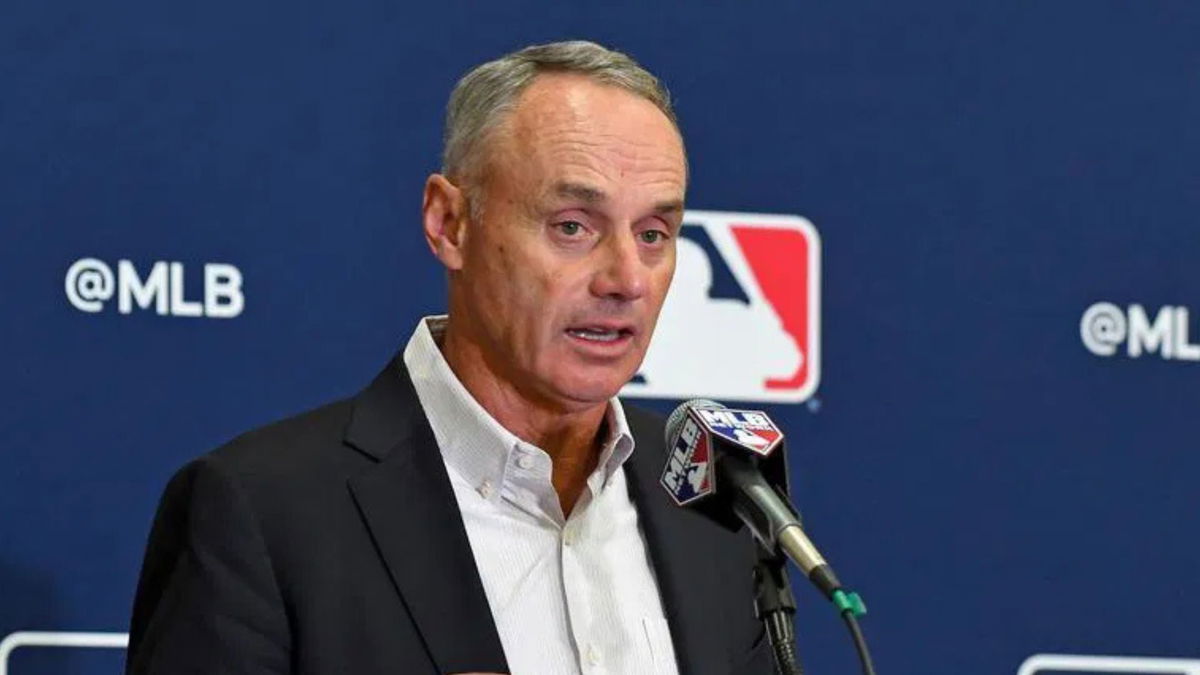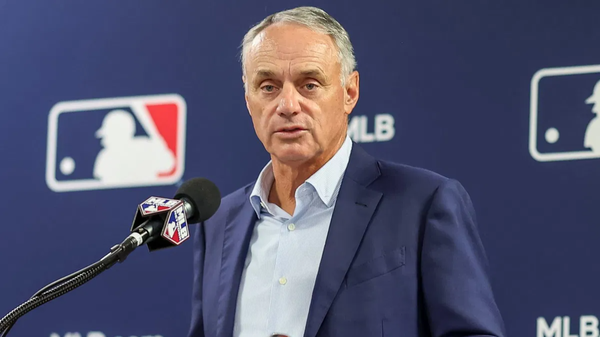
Imago
Image: IMAGO

Imago
Image: IMAGO
Rob Manfred operates Major League Baseball like a master chess player, artfully moving pieces across America’s sporting landscape. Remember his successful navigation of the sport through COVID, his spearheading of modernization initiatives for the game’s business operations (streaming platforms, for one), and his inclusion in restructuring the minor league? His role within MLB history cannot be overlooked. More recently, though, the commissioner’s expansion discussions paint a picture of transparent competition, but beneath the surface might lurk a calculated strategy that’s anything but honest with hopeful communities.
Watch What’s Trending Now!
So, the baseball world erupted when former MLB president David Samson pulled back the curtain on the league’s deceptive expansion playbook. Samson’s bombshell revelations expose how commissioners systematically mislead multiple cities, dangling the golden carrot of franchise ownership while knowing the outcome remains predetermined. This isn’t just business — it’s orchestrated manipulation designed to extract maximum financial commitment from unsuspecting civic leaders.
Samson delivered devastating insight into MLB’s strategic deception on his YouTube Channel: “We’ve talked to you about that playbook before. And that playbook means that you have to get multiple cities all thinking that they are the ones who are going to get the expansion team, because then when they get their ownership groups together that are local, they’ll get the biggest, wealthiest people wherever.” He continued, revealing the cynical calculation behind every public statement: “So, of course, the commissioner at all times is going to talk about lots of choices, lots of demand, when in fact, baseball knows very well they’re putting one team in the East, one team in the West time zone.”
ADVERTISEMENT
The former executive didn’t stop there, exposing how even baseball’s infrastructure changes serve this grand deception. Samson noted the strategic removal of league designations from umpire caps, explaining: “Do you think that umpires no longer wearing AL and NL on their cap is unrelated? Everything that we’ve been doing in the sport… was heading toward 32. Everything we were doing was heading toward geographic realignment.” This systematic erasure of traditional league boundaries reveals a decades-long preparation for expansion that cities never knew was already decided.
Meanwhile, Manfred casually floated his $2.2 billion expansion fee during a SporticoLive discussion, a price tag that represents seventeen times what teams paid in 1998. This astronomical figure serves the playbook perfectly—creating artificial scarcity while wealthy ownership groups in predetermined markets prepare their bids. Cities like Nashville, Montreal, and Portland chase shadows while baseball’s inner circle already knows which markets will claim victory in this rigged competition. But the commissioner’s pricing strategy reveals only part of his grand design. The real timeline behind this expansion charade exposes an even more calculated approach to reshaping America’s pastime.
ADVERTISEMENT
Manfred’s MLB Expansion Master Plan
This calculated manipulation becomes even more unsettling when you consider baseball’s deliberate stagnation since its last expansion push. Baseball froze at 30 teams when the Arizona Diamondbacks and Tampa Bay Devil Rays joined in 1998, creating the sport’s longest expansion drought since the league started growing in 1961. Rob Manfred knows his retirement deadline approaches in 2029, and he wants the expansion’s foundation laid before his exit.
The commissioner revealed his true timeline last February, acknowledging the process would outlast his tenure. “Those [expansion] teams won’t be playing by the time I’m done, but I would like the process along and [cities] selected,” Manfred admitted, essentially confessing he’s orchestrating a massive financial commitment from cities for teams they won’t see for years. The math benefits baseball perfectly—two franchises would create 16-team leagues, eliminating awkward daily interleague games nobody requested.
ADVERTISEMENT

Imago
Image: MLB.com
Manfred dropped his most revealing bombshell during an ESPN Sunday Night Baseball appearance, hinting at seismic structural changes beyond simple expansion. “I think if we expand, it provides us with an opportunity to geographically realign,” he explained matter-of-factly. “I think we could save a lot of wear and tear on our players in terms of travel. And I think our postseason format would be even more appealing for entities like ESPN, because you’d be playing out of the east and out of the west.”
Top Stories
Toronto Loyalist Raises Alarm as Shocking Bo Bichette Update Puts Blue Jays’ 2026 Dreams on the Brink

Red Sox’s Alex Bregman Fallout Becomes Evident as Two MLB Rivals Ignite Fierce Bidding War, per Report

$275M Cardinals Star’s MLB Future All but Sealed as U.S. Sportscaster Asks $2.75B Team to Make Bold Move

Mets Become Leading Contender For 30YO Ex-Phillies Star after David Stearns’ Mega Offseason Misses, Per Insider

Kyle Tucker Throws Blue Jays Into Chaos as Ross Atkins Forced Into Harsh Job Cuts

That innocent-sounding statement describes baseball’s nuclear option—destroying the American League and National League entirely, replacing them with Eastern and Western Conferences like basketball and hockey. Expansion doesn’t require demolishing the AL and NL, but it certainly makes restructuring easier to swallow for traditionalist fans.
ADVERTISEMENT
ADVERTISEMENT
ADVERTISEMENT
ADVERTISEMENT

